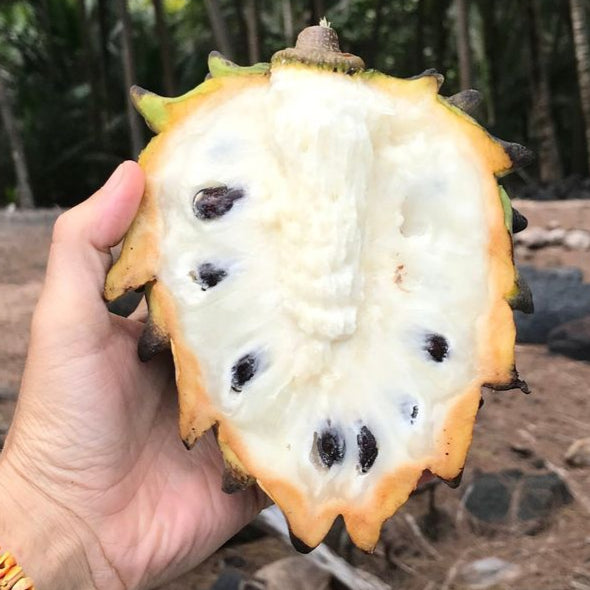A Rare Treasure of the Tropics: The Velvety-Sweet Biriba (Rollinia Deliciosa)
Common Name: Biriba, Wild Sweetsop
Botanical Name: Rollinia deliciosa
An Enchanting Gift from the Rainforests
Hailing from the lush tropical regions of South America, particularly Brazil, Peru, and Colombia, the Biriba, or Rollinia, is an extraordinary fruit that captures the imagination of tropical fruit lovers across the globe. With its uniquely shaped, soft-spined yellow skin and custard-like interior, this fruit is as exotic in appearance as it is in taste.
The plant belongs to the Annonaceae family and thrives in warm, humid climates. As a fast-growing, medium-sized tree, it brings an ornamental charm to any tropical or subtropical garden, making it an attractive choice for fruit enthusiasts who value both beauty and productivity.
Cultural and Local Identity
In Brazil, the fruit is widely recognized as "Biribá," and it plays a role in folk remedies and tropical diets. In Peru, it is referred to as "Anón," often eaten fresh or included in fruit-based preparations. In Colombia, it may appear in local markets under the name "Wild Sweetsop" or "Yellow Custard Apple," valued for its soothing, soft pulp.
The Taste of Tropical Whimsy
Imagine the smoothness of custard with the flavor fusion of banana, pineapple, and hints of coconut—that’s the best way to describe the Biriba’s remarkable taste. When ripe, the fruit becomes buttery soft, with a slight tartness that enhances its sweet tropical overtones. The jelly-like pulp melts in the mouth, delivering a refreshing sensation. The taste is so appealing that it is often compared to lemon meringue pie, though entirely natural.
One can enjoy it by simply scooping out the flesh with a spoon. The seeds are not edible and should be removed, but the rest of the experience is pure pleasure. Rollinia is perfect for smoothies, fruit salads, and even homemade sorbets. It makes an excellent dessert component for those looking to bring a new tropical note to their culinary repertoire.
Nutritional Wealth and Health Benefits
In addition to its delightful flavor, Rollinia deliciosa is a fruit with substantial nutritional power:
-
Rich in Vitamin C – Boosts the immune system and enhances skin health
-
Contains Calcium and Phosphorus – Supports bone and teeth strength
-
Iron Content – Promotes hemoglobin formation and prevents fatigue
-
Protein and Essential Amino Acids – Such as Lysine, Methionine, Threonine, and Tryptophan, crucial for overall cell repair, enzyme production, and brain health
-
Natural Carbohydrates – Offers energy without processed sugars
The presence of these elements makes Rollinia a supportive addition to daily diets, especially in tropical climates where hydration and nutritional balance are vital.
Cultivation and Plant Growth
-
Time to Fruit: 2 to 3 years after planting
-
Maintenance Level: Moderate
-
Growth Habit: Medium-sized deciduous tree with broad leaves
-
Preferred Conditions: Humid, warm tropical climate with well-draining soil
-
Watering: Regular moisture required, especially during fruit formation
-
Light Requirements: Full sun exposure enhances flowering and fruit quality
-
Pollination: Natural pollination occurs through beetles; hand pollination can enhance yield in some conditions
The Rollinia tree, once established, requires moderate care but rewards generously. Pruning can help shape the tree and support better airflow, preventing pest or fungal issues.
Preservation and Use
Biriba fruits are best consumed fresh as they ripen quickly and become delicate. However, when harvested at just the right moment before full ripeness, they can be stored in cool conditions for a few days. The fruit pulp can also be frozen and used later in desserts or smoothies, maintaining its texture and flavor.
Traditional Wisdom and Cultural Significance
In many South American traditions, Biriba is not only a fruit but a gentle remedy. Folk medicine recommends its pulp as a cooling food that helps with heat-related discomfort and mild digestive upsets. The tree itself is often planted near homes, not only for its fruit but for the serene shade it provides. In rural gardens, it is considered a fruit of comfort and hospitality, often offered to guests as a token of warmth.
Why Add Biriba to Your Life?
If you're seeking a rare, highly rewarding fruit tree that offers both nutritional excellence and tropical appeal, the Rollinia deliciosa stands out. Its minimal care requirements, combined with fast fruiting and captivating taste, make it an excellent choice for plant lovers and home gardeners alike.
Introduce this South American treasure to your fruit plant garden, where it will become a seasonal highlight, admired for both its golden appearance and unforgettable flavor. Whether you enjoy it fresh or blended into tropical drinks, the Biriba adds an exotic touch to daily life.
A Veliyath Gardens Specialty
At Veliyath Gardens, we proudly cultivate and provide high-quality Rollinia fruit plants, ensuring that this rare species continues to flourish in home gardens and orchards far beyond its native land. Our saplings are nurtured with care and ready to thrive under proper tropical or subtropical conditions.
Invite the magic of Biriba into your life—experience a new level of tropical indulgence that nourishes both body and soul. Let this remarkable fruit be the next treasure you grow at home.


